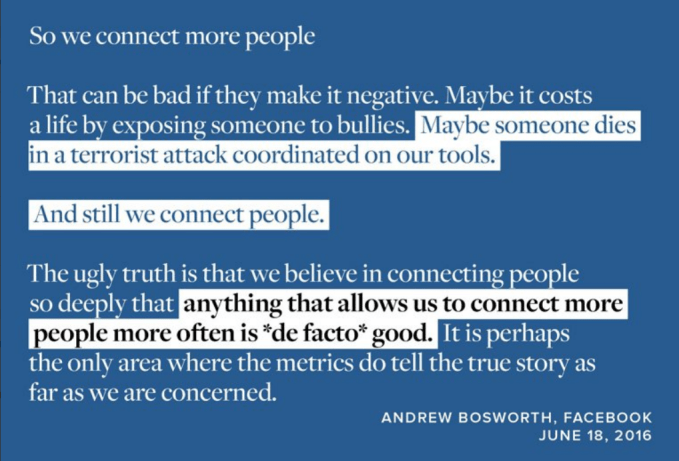These kinds of leaks didn’t happen when I
started reporting on Facebook eight years ago. It was a tight-knit cult
convinced of its mission to connect everyone, but with the discipline of a
military unit where everyone knew loose lips sink ships. Motivational posters
with bold corporate slogans dotted its offices, rallying the troops. Employees
were happy to be evangelists.

But then came the fake news, News Feed addiction, violence on Facebook Live, cyberbullying, abusive ad targeting, election interference and, most recently, the Cambridge Analytica app data privacy scandals. All the while, Facebook either willfully believed the worst case scenarios could never come true, was naive to their existence or calculated the benefits and growth outweighed the risks. And when finally confronted, Facebook often dragged its feet before admitting the extent of the issues.
Must Read: 1.BASIC OF NETWORKING & LEARN CCNA 2.How to find save password in any computer 3.10 best android app for hacking 4.What is Linux Operating System 5.How to crack pdf files password 6.What is IP address & How its works
Inside the
social network’s offices, the bonds began to fray. An ethics problem metastisized
into a morale problem. Slogans took on sinister second meanings. The Kool-Aid
tasted different.
Some hoped
they could right the ship but couldn’t. Some craved the influence and
intellectual thrill of running one of humanity’s most popular inventions, but
now question if that influence and their work is positive. Others surely just
wanted to collect salaries, stock and resumé highlights, but lost the stomach
for it.
Now the
convergence of scandals has come to a head in the form of constant leaks.
Ye bhi padhna chahiye aapko:
The trouble
tipping point
The more
benign leaks merely cost Facebook a bit of competitive advantage. We’ve learned
it’s building a smart speaker, a standalone VR headset and a Houseparty split-screen video chat clone.
Yet
policy-focused leaks have exacerbated the backlash against Facebook, putting
more pressure on the conscience of employees. As blame fell to Facebook for
Trump’s election, word of Facebook prototyping a censorship toolfor
operating in China escaped, triggering questions about its respect for human
rights and free speech. Facebook’s content rulebook got out
alongside disturbing tales of the filth the company’s contracted moderators
have to sift through. Its ad targeting was revealed to be able to pinpoint emotionally vulnerable teens.
In recent
weeks, the leaks have accelerated to a maddening pace in the
wake of Facebook’s soggy apologies regarding the Cambridge Analytica debacle.
Its weak policy enforcement left the door open to exploitation of data users
gave third-party apps, deepening the perception that Facebook doesn’t care
about privacy.

And it all
culminated with BuzzFeed publishing
a leaked “growth at all costs” internal post from Facebook VP Andrew “Boz”
Bosworth that substantiated people’s worst fears about the company’s disregard
for user safety in pursuit of world domination. Even the ensuing internal
discussion about the damage caused by leaks and how to prevent
them…leaked.
But the
leaks are not the disease, just the symptom. Sunken morale is the cause, and
it’s dragging down the company. Former Facebook employee and Wired writer
Antonio Garcia Martinez sums it up, saying this kind of vindictive,
intentionally destructive leak fills Facebook’s leadership with “horror”:
And that
sentiment was confirmed by Facebook’s VP of News Feed Adam Mosseri, who tweeted that
leaks “create strong incentives to be less transparent internally and they
certainly slow us down,” and will make it tougher to deal with the big
problems.
Those
thoughts weigh heavy on Facebook’s team. A source close to several Facebook
executives tells us they feel “embarrassed to work there” and are increasingly
open to other job opportunities. One current employee told us to assume
anything certain execs tell the media is “100% false.”
If Facebook
can’t internally discuss the problems it faces without being exposed, how can
it solve them?
Implosion
The
consequences of Facebook’s failures are typically pegged as external hazards.
You might
assume the government will finally step in and regulate Facebook. But the
Honest Ads Act and other rules about ads transparency and data privacy could end up protecting Facebook by being
simply a paperwork speed bump for it while making it tough for competitors to
build a rival database of personal info. In our corporation-loving society, it
seems unlikely that the administration would go so far as to split up Facebook,
Instagram and WhatsApp — one of the few feasible ways to limit the company’s
power.
Users have
watched Facebook make misstep after misstep over the years, but can’t help but
stay glued to its feed. Even those who don’t scroll rely on it as a fundamental
utility for messaging and login on other sites. Privacy and transparency are
too abstract for most people to care about. Hence, first-time Facebook
downloads held steady and
its App Store rank actually rose in the week after the Cambridge Analytica
fiasco broke. In regards to the #DeleteFacebook movement, Mark Zuckerberg
himself said “I don’t think we’ve seen a meaningful number of people act on
that.” And as long as they’re browsing, advertisers will keep paying Facebook
to reach them.
That’s why
the greatest threat of the scandal convergence comes from inside. The leaks are
the canary in the noxious blue coal mine.
Can Facebook
survive slowing down?
If employees
wake up each day unsure whether Facebook’s mission is actually harming the
world, they won’t stay. Facebook doesn’t have the same internal work culture
problems as some giants like Uber. But there are plenty of other tech companies
with less questionable impacts. Some are still private and offer the chance to
win big on an IPO or acquisition. At the very least, those in the Bay could
find somewhere to work without a spending hours a day on the traffic-snarled
101 freeway.
If they do
stay, they won’t work as hard. It’s tough to build if you think you’re building
a weapon. Especially if you thought you were going to be making helpful tools.
The melancholy and malaise set in. People go into rest-and-vest mode, living
out their days at Facebook as a sentence not an opportunity. The next killer
product Facebook needs a year or two from now might never coalesce.
And if they
do work hard, a culture of anxiety and paralysis will work against them. No one
wants to code with their hands tied, and some would prefer a less scrutinized
environment. Every decision will require endless philosophizing and
risk-reduction. Product changes will be reduced to the lowest common
denominator, designed not to offend or appear too tyrannical.
In fact,
that’s partly how Facebook got into this whole mess. A leak by an anonymous
former contractor led Gizmodo to report Facebook was suppressing
conservative news in its Trending section. Terrified of
appearing liberally biased, Facebook
reportedly hesitated to take decisive action against fake news.
That hands-off approach led to the post-election criticism that degraded morale
and pushed the growing snowball of leaks down the mountain.
It’s still
rolling.
How to stop
morale’s downward momentum will be one of Facebook’s greatest tests of
leadership. This isn’t a bug to be squashed. It can’t just roll back a feature
update. And an apology won’t suffice. It will have to expel or reeducate the
leakers and those disloyal without instilling a witch hunt’s sense of dread.
Compensation may have to jump upwards to keep talent aboard like
Twitter did when it was floundering. Its top brass will need to
show candor and accountability without fueling more indiscretion. And it may
need to make a shocking, landmark act of contrition to convince employees its
capable of change.
When asked
how Facebook could address the morale problem, Mosseri told me“it
starts with owning our mistakes and being very clear about what we’re doing
now” and noted that
“it took a while to get into this place and I think it’ll take a while to work
our way out . . . Trust is lost quickly, and takes a long time to
rebuild.”
Esse Bhi Padhe:-
1.How to Enable Bitlocker in windows 10 2.How to create folder without Icon 3.How to take driver backup in Windows 4.How to download Youtube video Pc or Mobile without any software
This isn’t
about whether Facebook will disappear tomorrow, but whether it will remain
unconquerable for the forseeable future.
Growth has
been the driving mantra for Facebook since its inception. No matter how
employees are evaluated, it’s still the underlying ethos. Facebook has poised
itself as a mission-driven company. The implication was always that connecting
people is good so connecting more people is better. The only question was how
to grow faster.
Now
Zuckerberg will have to figure out how to get Facebook to cautiously foresee
the consequences of what it says and does while remaining an appealing
place to work. “Move
slow and think things through” just doesn’t have the same ring to it.
If you’re a Facebook employee or anyone else that has
information to share with TechCrunch, you can contact us at Tips@techcrunch.com
or this article’s author Josh Constine’s DMs are open on Twitter. Here
are some of our feature stories on Facebook’s recent issues:
Facebook is the Kool-Aid turning sour
![Facebook is the Kool-Aid turning sour]() Reviewed by Anand Yadav
on
March 31, 2018
Rating:
Reviewed by Anand Yadav
on
March 31, 2018
Rating:







No comments: